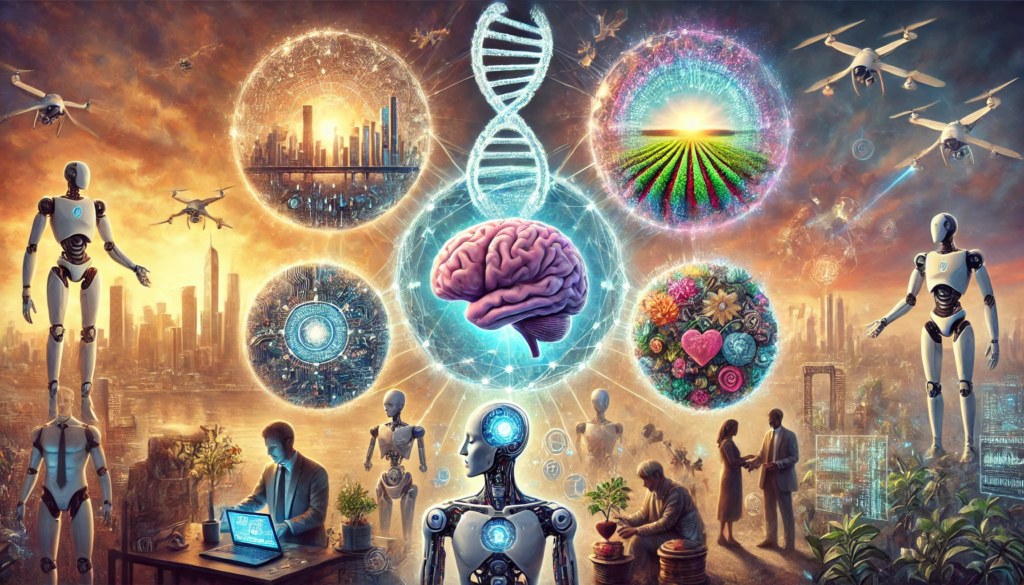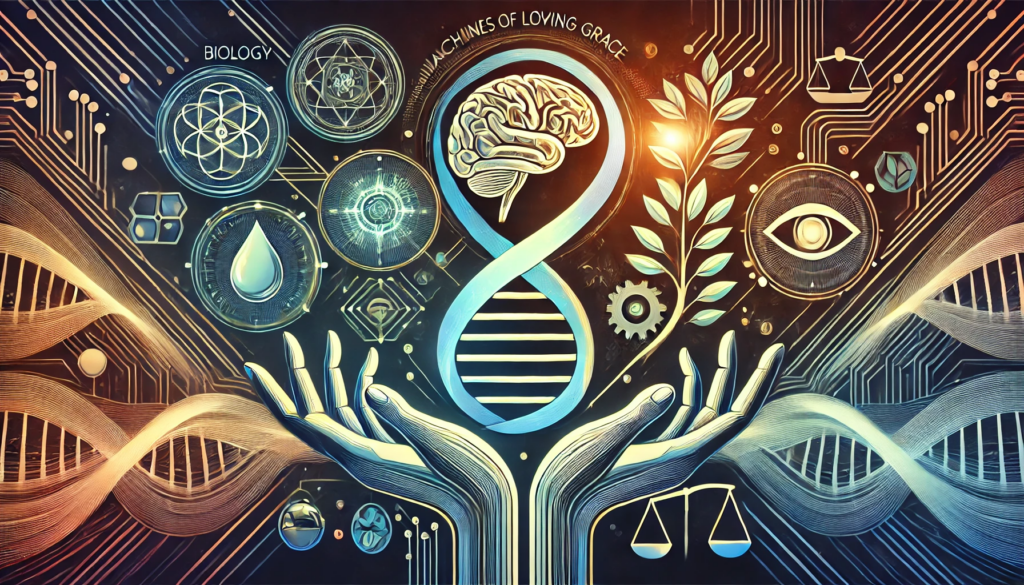
ChatGPT:
Machines of Loving Grace: An Expanded Summary
“Machines of Loving Grace” by Dario Amodei delves into the transformative possibilities of advanced AI technology, detailing its potential to significantly improve human life in critical domains such as healthcare, economics, governance, and personal fulfillment. While acknowledging the risks of AI, Amodei emphasizes a thoughtful, practical approach to maximizing its benefits. Below is an expanded exploration of the ideas presented in the article.
✨ Introduction: AI as a Double-Edged Sword
Amodei opens the article by addressing the dual nature of AI—its immense promise and its considerable risks. He describes advanced AI as having the potential to function like a “country of geniuses in a datacenter,” capable of solving problems with incredible speed and efficiency. This metaphor underscores the transformative scale of AI, but Amodei stresses the need for careful design and regulation to ensure positive outcomes.
Rather than succumbing to dystopian fears or overly optimistic hype, Amodei adopts a balanced, pragmatic approach. He emphasizes that his organization’s focus on AI risks is not to promote fear but to pave the way for long-term benefits by addressing safety concerns upfront.
🧬 Biology and Physical Health: A Paradigm Shift
In the field of healthcare, Amodei envisions AI as a tool for accelerating scientific discovery, transforming diagnostics, and developing novel treatments. AI could analyze vast datasets, enabling breakthroughs in curing diseases, extending human lifespans, and improving overall quality of life.
Key impacts include:
• Rapid drug discovery: AI could identify therapeutic compounds in days rather than years.
• Personalized medicine: Algorithms could tailor treatments based on an individual’s unique genetic profile.
• Health equity: AI-driven solutions might close gaps in access to quality care globally.
🧠 Neuroscience and Mental Health: Unlocking the Brain’s Mysteries
AI offers the potential to revolutionize our understanding of the human brain and mental health. Amodei discusses how AI could provide insights into neural activity, enabling breakthroughs in treating mental health disorders like depression, anxiety, and PTSD.
Notable possibilities include:
• AI-based diagnostic tools to detect mental health issues earlier.
• Personalized therapy systems leveraging data on patient progress.
• Enhanced brain-computer interfaces to restore function in neurological disorders.
🌍 Economic Development and Poverty Alleviation
Amodei sees AI as a catalyst for reducing economic inequality and alleviating poverty, especially in underdeveloped regions. By optimizing resource distribution, AI could spur economic growth and provide innovative solutions to complex social problems.
Specific applications include:
• Automating resource allocation to improve efficiency in sectors like agriculture, logistics, and energy.
• Developing AI-driven educational tools for underserved populations.
• Supporting local economies by enabling small businesses to leverage AI technologies.
🕊️ Peace and Governance: Reinventing Democracy
Amodei envisions AI playing a pivotal role in promoting peace and improving governance. By streamlining decision-making processes and enhancing data analysis, AI could help governments create fairer policies and respond more effectively to crises.
Potential applications include:
• AI-based platforms to detect and mitigate corruption.
• Decision-support systems to improve policy outcomes.
• Tools to monitor and manage conflict, enhancing global stability.
However, Amodei emphasizes the need for transparency and democratic oversight to ensure AI aligns with societal values.
💼 Work and Meaning: Redefining Human Purpose
AI’s impact on work and employment is a central theme. While automation may disrupt traditional jobs, Amodei suggests it could also free humans from repetitive tasks, allowing them to pursue more meaningful activities.
Key ideas include:
• Reducing the workweek to enable a better work-life balance.
• Creating opportunities for creative and intellectual engagement.
• Ensuring fair redistribution of wealth generated by AI-driven productivity.
Amodei highlights the importance of managing these transitions to prevent societal upheaval.
🌟 A Balanced Perspective
Amodei concludes with a call for balanced dialogue on AI, free from both fearmongering and unrealistic hype. By recognizing and addressing risks early, society can unlock AI’s transformative potential while mitigating its downsides.
His vision hinges on collaboration between technologists, policymakers, and civil society to ensure that AI serves as a force for good. He stresses that this balance is not only possible but necessary to create a future where AI enhances, rather than detracts from, the human experience.
📝 Key Takeaways
1. AI’s Transformative Potential: Amodei describes AI as comparable to a country of geniuses capable of tackling complex challenges.
2. Healthcare Innovation: AI could accelerate drug discovery, provide personalized medicine, and enhance global health equity.
3. Mental Health Breakthroughs: Advanced AI might revolutionize treatments for mental health conditions and unlock new understandings of the brain.
4. Economic Opportunities: AI could reduce poverty and spur economic development through optimized resource allocation and innovation.
5. Improved Governance: AI has the potential to promote peace and strengthen democratic institutions.
6. Redefining Work: Automation could free people from repetitive tasks, creating space for creativity and meaning.
7. Mitigating Risks: Amodei focuses on addressing AI risks early to ensure its benefits are realized.
8. Global Collaboration: A multidisciplinary approach involving governments, businesses, and researchers is vital for responsible AI development.
9. Ethical Oversight: Transparency and democratic control are essential to align AI with human values.
10. Balanced Narrative: Amodei advocates for a nuanced conversation about AI, avoiding both fear and hyperbole.
FAQs: Machines of Loving Grace
Q1: What is the main focus of “Machines of Loving Grace”?
A: The article explores the transformative potential of advanced AI, focusing on its ability to improve human life in areas like healthcare, mental health, economic development, governance, and work. It also emphasizes addressing risks associated with AI to unlock its full benefits.
Q2: How does Dario Amodei view the role of AI in healthcare?
A: Amodei believes AI can revolutionize healthcare by accelerating drug discovery, enabling personalized medicine, and improving access to healthcare for underserved populations.
Q3: What are some potential mental health applications of AI discussed in the article?
A: AI could enhance diagnostics, provide personalized therapy, and lead to breakthroughs in understanding and treating mental health conditions like depression, anxiety, and PTSD.
Q4: How can AI contribute to economic development and poverty alleviation?
A: AI can optimize resource allocation, boost economic efficiency, and provide education and tools to underprivileged communities, fostering economic growth and reducing inequality.
Q5: What role does AI have in improving governance and promoting peace?
A: AI can help create fairer policies, detect and reduce corruption, and manage conflicts effectively, ultimately strengthening democratic institutions and promoting global stability.
Q6: What impact will AI have on the future of work?
A: AI could automate repetitive tasks, enabling shorter workweeks and creating opportunities for more meaningful, creative, and intellectual pursuits. However, careful management is needed to avoid societal disruptions.
Q7: What risks of AI does Dario Amodei emphasize?
A: Amodei highlights risks like misuse, unintended consequences, and lack of transparency. He stresses the importance of early interventions to address these risks and ensure AI’s benefits are maximized.
Q8: Why is a balanced approach to AI important?
A: A balanced approach avoids both fearmongering and unrealistic optimism, fostering constructive dialogue and responsible development to ensure AI enhances human life.
Q9: How can AI align with human values?
A: Transparent systems, democratic oversight, and ethical frameworks are crucial to align AI’s development with societal values and ensure its outcomes are beneficial for all.
Q10: What role does collaboration play in AI’s future?
A: Amodei emphasizes the need for collaboration between technologists, policymakers, researchers, and civil society to address risks and maximize the positive impacts of AI.

